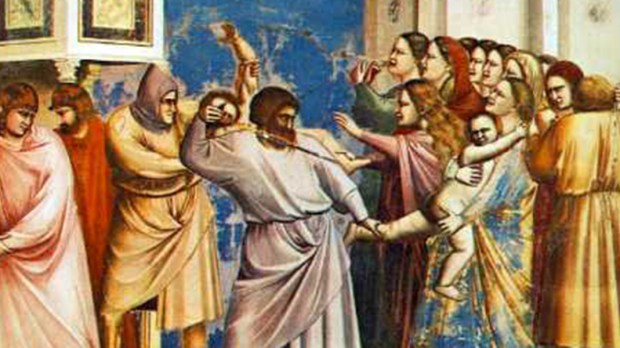Lenten Campaign 2025
This content is free of charge, as are all our articles.
Support us with a donation that is tax-deductible and enable us to continue to reach millions of readers.
Some of the events that Christians commemorate during the Christmas season are so shrouded in mystery that many non-Christians have a hard time believing in them. The Virgin Birth is a prime example. Another event, however, which is remembered just a few days after December 25, is the Martyrdom of the Holy Innocents—children allegedly slaughtered by King Herod in order to ensure that the Christ Child would be killed, removing any possible competition to Herod’s claim to the throne.
One Catholic apologist, however, has taken the controversy head-on. Gary Michuta acknowledges that for many people, the slaughter of the Holy Innocents is a tall tale. But he writes that it is entirely plausible.
For many critics, the stumbling block in accepting this story is the fact that Jewish historian Flavius Josephus makes no mention at all of the event. One would have expected Josephus, who chronicled the life of King Herod, to include such a significant event in his history.
Michuta points out that Herod had good reason to feel his hold on the throne was tenuous. He was installed as king of Judah by the Romans. In addition, he was an Edomite, “which meant that in the eyes of the Jews he had no right to be their king because God promised David that his descendants would sit on the throne forever.”
The Gospel According to St. Matthew refers to Jesus as the “Son of David.”
“Herod’s murderous response also fits our knowledge of Herod,” Michuta writes. “He murdered several of his own family members because he suspected disloyalty—causing Caesar Augustus to quip that ‘It is better to be Herod’s pig than a son.'”
Murdering these young children is perfectly in keeping with everything we know about Herod. Why, then, do some doubt? The arguments against the historicity of this event are based almost entirely on silence, particularly the silence of a first century Jewish historian named Josephus. Josephus provides us with several details about Herod’s life and works, but never mentions the murder of the Holy Innocents. It is assumed, therefore, that the event must never have happened. But is this conclusion sound? Part of the problem is it was once thought that the number of children murdered ran into the thousands and therefore the scale of the tragedy couldn’t have escaped Josephus’ attention, if it did happen. But more recent research has shown that the actual number would have been considerably smaller, perhaps less than 20 children killed. The figure is still large, but compared to the carnage Herod wrought during his reign, Josephus could have omitted it without any trouble.
“Moreover, it is clear from Josephus’ other treatments of historic figures that he never intended to given an exhaustive account of his subjects,” continues Michuta, who blogs at Hands On Apologetics. “For example, Josephus’s description of the Essenes, the Jewish group famous for producing the Dead Sea Scrolls, entirely omits any mention of the group’s apocalyptic worldview, which was its hallmark. Therefore, if the first century Jewish historian chose not to give an exhaustive account of the acts of Herod, there is no reason to suspect the historicity of anything omitted by him.”
Furthermore, Josephus might have omitted the Slaughter of the Innocents because he might not have connected Herod with the murders. “There’s nothing in Matthew that suggests that Herod sent his own troops to kill these children,” Michuta writes. “In fact, Matthew 2:16 only says that Herod “… sent and killed” the children. It’s quite possible that Herod did not send his own troops (making it an official act), but rather sent banditti to do his bidding. A very ancient extra-biblical text known as the Protoevangelium of James seems to support this idea. In chapter 22, the text says, ‘And when Herod knew that he had been mocked by the Magi, in a rage he sent murderers, saying to them: Slay the children from two years old and under.'”
For Christians who knew that Herod had been “deceived” by the Magi, whom he had hoped to use as a source of intelligence about the newborn “King of the Jews,” Herod’s role in the Bethlehem tragedy would have been obvious, Michuta points out. “But for a later Jewish historian who wouldn’t have known this information the tragedy in Bethlehem would have been seemed like just another senseless act of brutality common for the era.”

